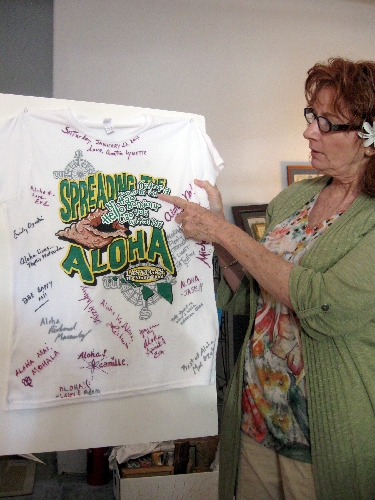Hawaiian group aims to preserve island heritage

Las Vegas has been dubbed the “ninth island” of Hawaii, and a number of residents are spreading the aloha to an ever-growing number of transplants in a variety of ways.
“We tend to stick together,” said Pat Gorsch-Pauole, a Las Vegan who spent 30 years in Hawaii. “So many people have Hawaiian or Polynesian roots and have been displaced for whatever reason (but) they stay together.”
She spoke to the ohana, which means “family” in Hawaiian, culture thriving in Southern Nevada. Many former Hawaiians have opened restaurants and stores and host halau hulas, or dance schools, and island-centric radio programs in the valley.
The Las Vegas Hawaiian Civic Club hosts events to preserve the heritage and has open membership.
At a recent music festival, event coordinators requested forming a Hawaiian village for many of the sectors to merge and for the “aloha spirit” to flourish.
No matter if one is a native, a short-time resident or just set foot on Hawaiian soil for vacation, the island paradise stays with you, said northwest Las Vegas resident Lynette Macauley.
At 9 years old, she started collecting pre-statehood Hawaiian postcards.
She lived near Honolulu for five years and kept up with the culture after she moved to the mainland.
“I had a Jewish wedding with Hawaiian music 22 years ago,” she joked.
She’s been active with the annual Ho’Olaule’A festival , University of Hawaii Alumni Club events and has been a guest on Emory Nihipali’s KUNV-FM 91.5 Hawaiian radio show “Little Grass Shack.”
Macauley has a line of apparel, mugs and mouse pads emblazoned with her trademarked “Las Vegas: The Ninth Island” insignia that she sells online and at events.
Hawaii native Mel Ozeki coined the phrase of Las Vegas as the ninth island in a 1990s edition of his former magazine Ohana.
He also dubbed the California Hotel , 12 E. Ogden Ave., its “mayor,” Gorsch-Pauole said.
Its originator, Sam Boyd, lived in Hawaii in the 1930s and was drawn to its welcoming lifestyle, she said.
He also monopolized on a strong gaming subculture. Nihipali said he was influential in securing two round-trip flights a day into Las Vegas via Hawaiian Airlines.
Macauley said laying down the Las Vegas welcome is an extension of Hawaiian ways to which Boyd was attracted.
Macauley, Gorsch-Pauole and Nihipali said they find themselves striking up kinship with strangers with Hawaiian surnames, speaking “pigeon English” or those simply donning turtle, hibiscus or island-centric clothes.
Nihipali said he often pulls up next to drivers with Hawaiian stickers, and the motorists use the shaka hand signal.
“It creates a bond,” he said.
Nihipali ‘s weekly radio show features Hawaiian music, discussions of “topics in the tropics” and a Hawaiian word of the day.
“Most of my listeners aren’t Hawaiian,” he said.
Macauley encouraged locals to patronize Hawaiian establishments and get to know their fellow island transplants.
“When people go to Hawaii, they get it,” she said. “It’s beautiful, but you get the people are nice, too.”
For more information about spreading the aloha, visit alohaninthisland.com or email lynette@alohaninthisland.com.
For information on the University of Hawaii Alumni Association Las Vegas chapter, call 353-8079.
To reach the Las Vegas Hawaiian Civic Club, call 382-6939.
Contact Centennial and Paradise View reporter Maggie Lillis at mlillis@viewnews.com or 477-3839.